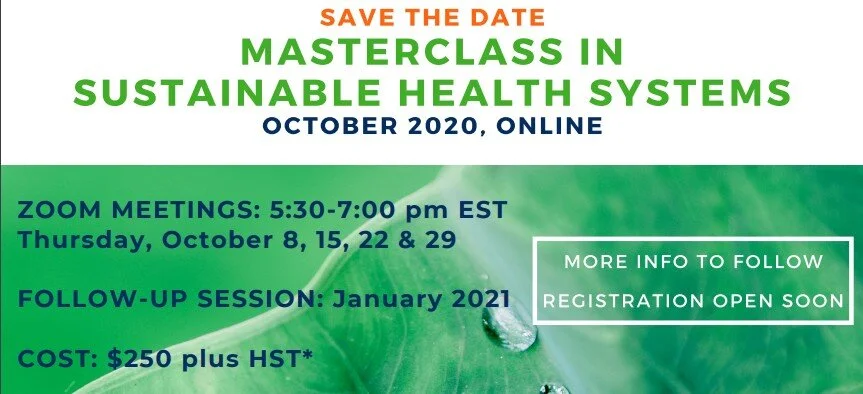CLICK HERE TO REGISTER!
DETAILS
COURSE TYPE: Online Course: Self-directed learning + four online sessions
DATES:
Online content available October 1-29, 2020
Weekly sessions: Thursday, October 8, 15, 22 & 29, 5:30-7:00 pm EST
ONLINE LEARNING PLATFORM: Canva
FOLLOW-UP SESSION: January 2021 (date TBD)
COST: $250 plus HST*
*If cost is prohibitive, please contact us as some subsidies are available.
COURSE DESCRIPTION
Climate change is recognized as the greatest threat to global health in the 21st century (Lancet, 2018; WHO, 2015; UCL/Lancet Commission, May 2009). Canada’s healthcare system is a large, resource-intensive sector of the Canadian economy; it is responsible for at least 4.6% of national carbon dioxide emissions annually (Eckelman, 2018), and ranks third in per capita health system emissions globally (Lancet, 2019). While the sector dedicated to extending and improving our quality of life is a significant contributor to a phenomenon putting human health at risk, there are many opportunities for the health sector to develop and implement sustainability interventions that protect, promote, and prioritize health.
The Masterclass in Sustainable Health Systems is a professional education program for frontline staff and administrators and leaders within care delivery, professional, and support organizations with an interest in high quality, low carbon care. This year, the program is being offered online by the University of Toronto's Centre for Sustainable Health Systems in partnership with Dalhousie's Healthy Populations Institute.
Through self-directed online learning and weekly Zoom meetings, participants will gain knowledge, develop skills, and forge collaborations that will help them advocate for and participate in a shift toward a more environmentally sustainable health system. A certificate of completion will be awarded at the end of the course.
AGENDA
PART I: Motivating Change: Inspiring a shift toward sustainable healthcare
Week 1: The Case for Change: What is “sustainable healthcare” and why do we need it?
Meeting: Thursday, October 8th; 5:30-7:00 pm EST
Week 2: Communicating the Need for Change: Strategic sustainability messaging
Meeting: Thursday, October 15th; 5:30-7:00 pm EST
PART II: Making Change: Innovating a shift toward sustainable healthcare
Week 3: Quality Improvement: Approaching sustainability through a QI lens
Meeting: Thursday, October 22nd; 5:30-7:00 pm EST
Week 4: Measurement: Quantifying the need for change & evaluating its impact
Meeting: Thursday, October 29th; 5:30-7:00 pm EST
LEARNING OBJECTIVES
PART I: Motivating Change: Inspiring a shift toward sustainable healthcare
Part I will provide an introduction to the relationship between health systems and environmental sustainability, an overview of strategies to communicate effectively on sustainability opportunities.
At successful completion of “Week 1: The Case for Change,” learners will be able to:
Recognize the range of environmental challenges facing the human community, and their implications for population health
Explain the environmental impacts of the health sector
Identify the characteristics of sustainable care
Recognize opportunities for sustainable improvements in the health sector
At successful completion of “Week 2: Communicating the Need for Change,” learners will be able to:
Articulate why they have a particularly important role to play in advocating for change
Develop an understanding of some of the key challenges they may face in generating meaningful engagement on sustainability in healthcare, and how to address these
Identify whether there is a particular culture of sustainability that characterizes their care setting and determine what framings of sustainability are most likely to resonate/generate buy-in in that setting
PART II: Making Change: Innovating a shift toward sustainable healthcare
PART II will provide a solid understanding of how foundational concepts and tools of quality improvement and environmental footprinting can be used to address sustainability challenges in the health sector.
At successful completion of “Week 3: Quality Improvement,” learners will be able to:
Explain the Sustainable Quality Improvement (SusQI) Framework
Explain the Quality Improvement process
Approach sustainability interventions through a SusQI lens
Outline a strategy for implementing a sustainability intervention
At successful completion of “Week 4: Measurement,” learners will be able to:
Understand the various indicators used to quantify environmental impact and how they relate to health systems
Begin to develop a sense of the different methods that can be used to quantify these indicators
Identify key data points that can be collected to make the case for change and to evaluate the success of the change

